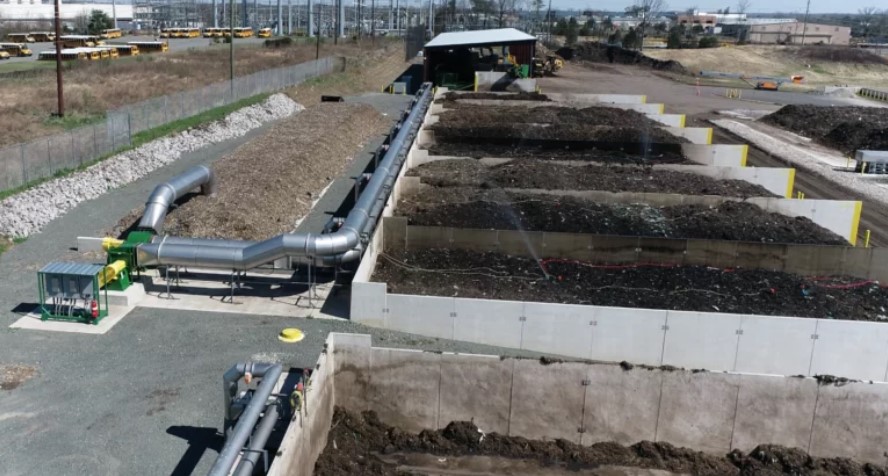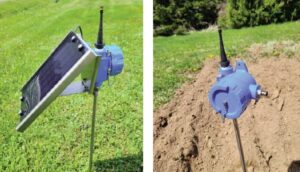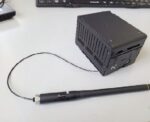Cancoppas is the exclusive Canadian Distributor of the Intempco CompostNet Temperature Monitoring system

Beneficial microorganisms in a compost pile require a certain temperature range for optimal activity – 131 to 160 degrees Fahrenheit. Pile conditions within that range will promote rapid decomposition and destroy pathogens and weed seeds. Above that temperature range, beneficial microorganisms cannot survive. Below that range, decomposition will occur more slowly, and pathogens and weed seeds may remain in the final compost. Pile temperatures must remain at 131 degrees Fahrenheit or above for several days to meet standards for reducing pathogens. The exact amount of time depends on the method of composting.
Our solution is : Intempco CompostNet an advanced wireless temperature monitoring system designed specifically for compost piles. Up to six temperature sensors can form part of the probe.
Utilizing the LoRa (Long Range) low-power wireless protocol, CompostNet ensures reliable, long-distance communication and seamless data transmission, even in challenging environments.
Choose from replaceable batteries, rechargeable Lithium-ion batteries (using the USB-A port), or the economical long lasting energy efficient solar powered version.
The solar panel option allows the probes to operate maintenance-free indefinitely with just a few hours of direct sunlight per week.
Contact us to discuss your application.

Long-Range Communication: Leveraging LoRa technology, Intempco CompostNet provides robust connectivity over extended distances, making it ideal for large composting operations or remote locations where other wireless protocols might falter.
Real-Time Temperature and Data Monitoring: The system continuously tracks the temperature within the compost pile, offering real-time information at varying depths in the compost pile to ensure optimal conditions for efficient decomposition. A single compost probe can provide up to six temperature readings along the length of the probe. Additional information and functionality provided to the user includes battery status, internal enclosure temperature, time stamp, Received Signal Strength Indicator (RSSI), and remote (wireless) probe shutdown.
Application Server: Data from the compost probes is transmitted wirelessly to one or more gateways located in the field. The gateways then relay the data to a central application server via a single Powerover-Ethernet (PoE) category 5e cable that provides both power and a high-speed communication link. Application software allows multiple users to query the server database, to generate regulatory reports, or to take immediate action to adjust the composting process.
Durable and Weatherproof Sensors: The temperature probes are corrosion resistant, rugged and weatherproof, ensuring reliable performance in harsh, outdoor environments. The instrument housing provides protection against corrosion, dust particles, and water (Type 4X, IP66).
Energy Efficient: Designed with low power consumption in mind, the system’s temperature probes are available with either single-use or rechargeable lithium-ion batteries. Probes with rechargeable batteries can be charged via any USB-A port in a matter of hours while the solar panel option allows the probes to operate maintenance-free indefinitely with just a few hours of direct sunlight per week.
Scalable Design: Whether you manage a small compost pile or a large-scale composting facility, CompostNet is scalable to meet your needs. You can easily add more compost probes and gateways as your operation expands.
Communication Protocols: For complex facilities with automated aeration and irrigation systems, CompostNet offers a range of communication protocols such as MODBUS that facilitate the integration of the system with a PLC or Supervisory Control and Data Acquisition Systems (SCADA).
Easy Installation: With a straightforward setup process, CompostNet can be quickly deployed and integrated into your composting system, allowing you to start monitoring with minimal effort.

The LoRaCube is a compact, all-in-one, space-saving solution designed to support multiple wireless sensors. This highly integrated device combines a LoRa gateway with an embedded server, offering reliable, long-range, low-power communication. Powered by Power over Ethernet (PoE) technology, it simplifies installation by using a single Ethernet cable to both power the device and connect it to the network, reducing the need for additional wiring and power outlets. The embedded server processes and stores sensor data, while the accompanying app allows users to query and effortlessly access real-time sensor information from the server.
This compact, combined gateway/server solution is ideal for applications that require efficient data management and remote monitoring, offering a seamless, hassle-free user experience with minimal installation.
Product Features :
• Compact Design for Easy Deployment in Space-Constrained Environments
• LoRa Connectivity for Long-Range, Low-Power Wireless Sensors
• Power over Ethernet (PoE) for Simplified Installation and Connectivity
• Embedded Server for Data Processing, Management, and Storage
• Desktop App for Querying the Server and Accessing Real-Time Data
• Scalabe, Secure, and Reliable Performance for Multi-Sensor Networks
Please contact us at controls@cancoppas.com or call us at the appropriate office should you require additional assistance.
Contact Us


